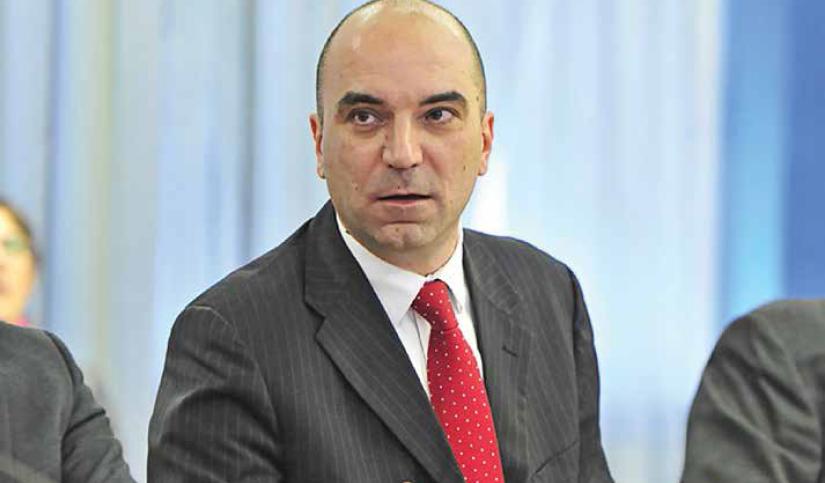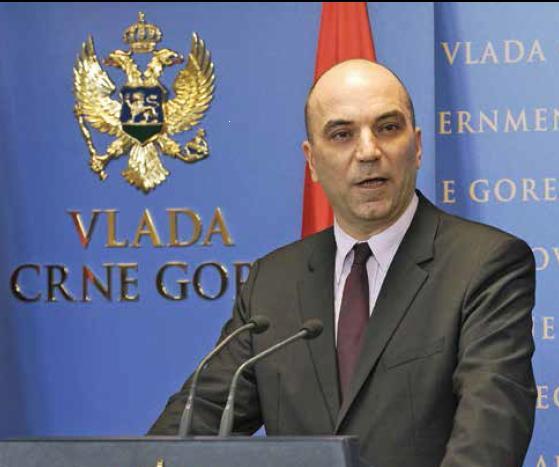For over a decade, the Montenegrin government has been working on creating an environment conducive to investors both through economic policies in the country and, as of recently, through active participation in infrastructure projects that will link the Western Balkan countries and the region to the rest of Europe
Rounding off the preparatory process of oil and gas exploration on the Montenegrin seabed is just one of the large-scale projects that the Montenegrin government and the Ministry of Economy have been working on which can contribute to the country’s economic development. Additionally, there are many activities carried out by the government ministries on improving the business climate and creating new opportunities for investors – says Vladimir Kravaric, Economy Minister in the Montenegrin government. The Paris-Balkans Summit took place this month within the framework of the Berlin Process. Could you rate for us the economic cooperation between the Balkan countries in this context?
– The West Balkan countries connecting primarily to each other and then to the European Union is done for very strong political and economic reasons. The main reason is the necessity to fill the real physical and infrastructural void which prevents us from being truly connected. The idea of the West Balkan countries connecting between each other emerged in 2014 following the meeting in Berlin and continued in Vienna in 2015 and in Paris this year. It is very commendable that the regional countries have recognised the importance of this project and, in that respect, have been actively participating in suggesting concrete projects that would result in infrastructural networking. Good transport links are crucial for the sales of goods and services that are produced or are going to be produced in Montenegro. Good energy links are also necessary for future investments in the energy sector, as well as for free flow of energy through Montenegro which would benefit our country both financially and strategically. The Trans-Balkan Corridor is the first
project approved in Vienna. This project becomes operational once the relevant agreement is signed and I think that, with this project, Montenegro has demonstrated its seriousness and commitment to a
process like the Berlin one.
A financial agreement stipulating construction of the Trans-Balkan Electricity Corridor was signed in Lastva Grbaljska recently, as a result of the West Balkan / Berlin initiative. What does this mean for the Montenegrin economy and for overall energy sector?
The Trans-Balkan Electricity Corridor, i.e. the power transmission grid that will connect Montenegro and Serbia and, a later stage, Bosnia and Herzegovina too, is a project of enormous importance for the energy sector and the overall Montenegrin economy. Furthermore, the project has a regional and European importance because it entails boosting the Montenegrin infrastructure surrounding the submarine energy cable that will stretch to Italy and construction of power lines between Montenegro and Serbia. In this way, Montenegro will become the hub of energy stream in this part of the world. The project will also completely change the perspectives of other neighbouring countries considering the opportunities for connecting to the Western Europe via Montenegro.
The project of constructing the aforementioned submarine cable stretching to Italy will make sense and reach its full potential only if the Trans-Balkan Electricity Corridor project is implemented. The project’s value stands at €127 million. With the help of the Montenegrin government, the Montenegrin Power Transmission System (CGES) has secured a loan from the EBRD and the German development bank KfW. The recently signed agreement stipulates co-financing of the loan from a €25-million-donation. This is the first project that has been approved in Vienna which had been initiated through the Berlin Process and based on the idea of integrating the
Western Balkan countries.
The Ionian-Adriatic gas pipeline (IAP) is another project that received the EU’s support via the Western Balkan Investment Framework. How far along is this project?
– At a ministerial meeting with the representatives of Croatia, Bosnia and Herzegovina and Albania which took place in Montenegro recently, the involved parties agreed to form an operational task force in charge of developing the Ionian-Adriatic gas pipeline with HQ in Montenegro as soon as possible. I am happy that the IAP project is getting new regional and general dynamics because we reached a detailed agreement at the meeting to put together a project management unit which would be based in Montenegro and which would comprise of the representatives of the ministries and gas transmission system operators from Croatia, Albania, Montenegro and Bosnia and Herzegovina. Let me remind you that following the 10th Call for Proposals within the Western Balkan Investment Framework the Ministry of Economy was given a 550,000 grant to draft the Master Gas System Installation Plan for Montenegro. The plan will give an overview of the current situation in the Montenegrin gas market, as well as list institutional measures that have to be devised at the ministerial level and by the
bodies that regulate this segment.
What phase is the Montenegrin seabed oil and gas exploration projects at?
– The Montenegrin National Parliament made the last step in terms of the project’s implementation by adopting the draft agreement on oil and gas exploration on the Montenegrin seabed thus giving its approval to the consortium made of Italian company ENI and Russian company Novatek to obtain concessions for oil and gas exploration. This is a green light for the agreement with the Italian-Russian consortium to be signed after which the companies. That were given the concessions are allowed to conduct exploration on four assigned segments. Also, the government has recently approved the draft agreement for two exploration blocks with the Greek company Energean Oil & Gas and the document will now have to go through the same parliamentary procedure just like the Italian-Russian consortium. It is important to mention that, if oil is found, Montenegro will benefit greatly from that which is a legal guarantee. The Law on Hydrocarbons stipulates formation of a hydrocarbon fund that will receive a part of the money that the state will collect from the profit tax paid by the companies. Out of the total revenue, the Fund will receive 85% and the state budget 15%. Then there is the Law on Taxation of Upstream Hydrocarbon Industry which stipulates that 54% of the collected profit tax paid the companies from their upstream operations and equipment and 9% of the collected dividend tax (on capital gains) will also end up in the state budget. The revenue and capital gains from the tax on upstream operations and related equipment are considered the direct revenue for the state of Montenegro. It is also worth mentioning that all the exploration operations will be carried out in line with the highest environmental standards.
Which areas still lack investments and what is government doing to boost these investments?
– For over a decade, the Montenegrin government has been working on creating an environment conductive to investors starting with the tax policy all the way to the comprehensive legal framework that regulates the right to own, the freedom to trade and the freedom of capital flow. In terms of the sectors suitable for investments, tourism, energy, transport and agriculture are the most competitive ones apart from the emerging industries like IT. Through various
projects like development of business zones and incentives for direct investments, the Montenegrin government is creating a competitive
business environment. The business zone project has been implemented since 2012 and, at this moment, nine Montenegrin
business zones of local interest are open to investments. Also, by the end of this year, the Ministry of Economy will have started developing business zones of strategic interest and, by doing so, create another mechanism for attracting large investors who are strategically important for the country’s economic development. It is also important to mention that foreign investors in Montenegro have the same treatment as the national ones, i.e. they can invest under
same conditions as domestic investors.
Like many European countries, Montenegro has also embarked on a branding process. What awaits you in this process?
– In line with the global trends, the Montenegrin government has embarked on the process of national branding with the successful processes of accession to the EU and NATO greatly benefitting the branding process. Considering all the advantages that Montenegro has, we believe that branding our country is one of the ways to round off what our country has to offer and thus valorise its values and boost its image with the goal of raising its visibility and recognisability in the world. In this way, we are going to raise the competitiveness of our economy on foreign markets. The first step in this process, which we have already made, is choosing the design of Montenegro’s national brand or its hallmark. This hallmark should appear on as many Montenegrin products as possible which are known for their quality, as well as become a part of the insignia of successful sports clubs, companies etc. By doing so, the foreign countries will associate the hallmark with Montenegro which, in the end, would result in many economic, social, and political benefits for the country.

